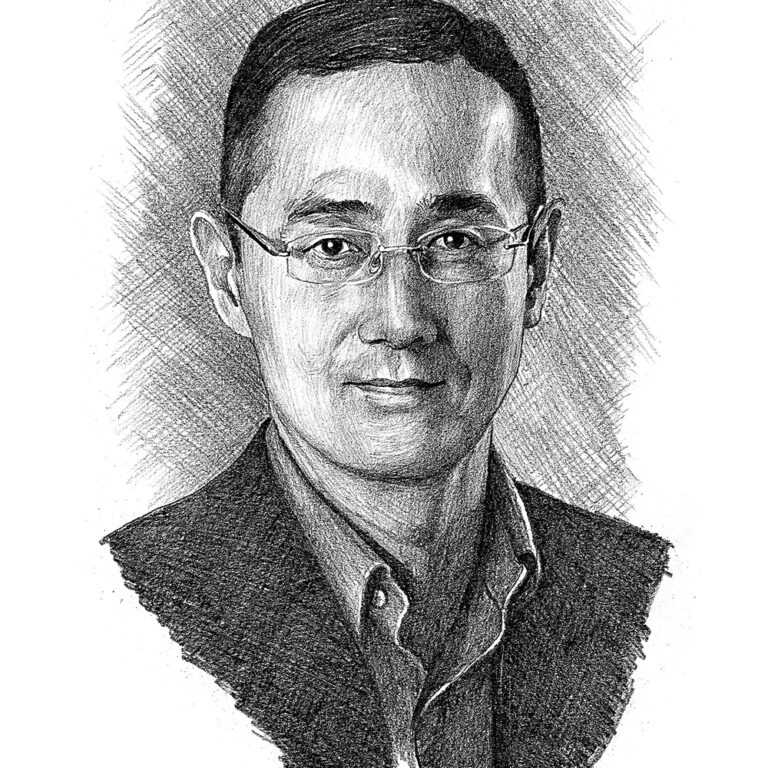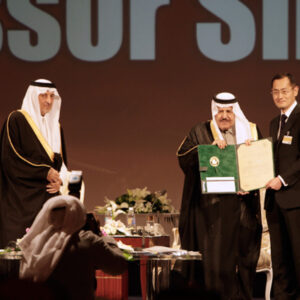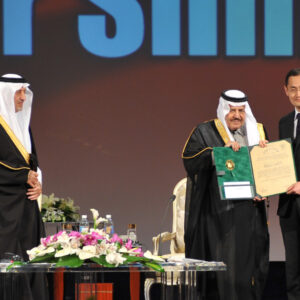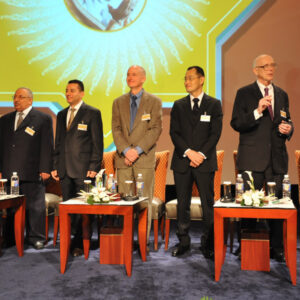

Professor Shinya Yamanaka
King Faisal Prize in Medicine 2011 Laureate
Topic: "Stem Cell Therapy "
When a scientist lifts one veil, the researcher often discovers yet another. However, sometimes a scientist with the right amount of luck suddenly discovered the truth upon pulling away a certain veil

Shinya Yamanaka received his M.D. at Kobe University School of Medicine in 1987 and Ph.D. at Osaka University Graduate School Division of Medicine in 1993. He completed a residency in orthopedic surgery at the National Osaka Hospital in 1987-1989 and a postdoctoral fellowship at the Gladstone Institute of Cardiovascular Disease in San Francisco, U.S.A. in 1996. He is currently the Director of the Center for Induced Pluripotent Stem Cell Research and Application (CiRA) at Kyoto University in Japan, a Professor at the Institute for Integrated Cell-Material Sciences at Kyoto University, a Senior Investigator in stem cell biology at the Gladstone Institute of Cardiovascular Disease in San Francisco, and a Professor of Anatomy at the University of California, San Francisco.
Professor Yamanaka’s distinguished career in stem cell research has been crowned by his discovery reported in 2006 that the addition of only four genes could revert adult mouse skin cells back to embryonic-like stem cells. These induced pluripotent stem cells (iPS), as they are now known, could turn into all of the different cell types of the body and appeared to have the similar properties as embryonic stem cells without the need for destroying an embryo, thus circumventing many ethical concerns regarding stem cell research. The following year, Professors Yamanaka and James Thomson independently reported that they succeeded in reprogramming human adult skin cells into iPS cells. Yamanaka’s landmark discoveries together with those of Thomson’s have led to a dramatic surge in research on stem cell biology. Professor Yamanaka and his group are currently actively engaged in iPS cell research towards regenerative medicine and as a research tool for drug discovery.
Professor Yamanaka’s outstanding contributions to stem cell research have been recognized by numerous awards including: Meyenburg Cancer Research award in 2007, Yamazaki-Teiichi Prize in Biological Science and Technology in 2008; Robert Koch Prize in 2008; Shaw Prize in Life Science and Medicine in 2008; Sankyo Takamine Memorial Award in 2008; Lifetime Scientific Achievement Award of the American Skin Association in 2008; Lewis S. Rosenstiel Award for Distinguished Work in Basic Medical Research in 2009; Gairdner Foundation International Award in 2009; Albert Lasker Award for Basic Medical Research in 2009; March of Dimes Prize in Developmental Biology in 2010; Kyoto Prize in Biotechnology and medical technology in 2010, and the Balzan Prize in 2010. In 2007, Professor Yamanaka was recognized by the Time magazine as a “Person Who Mattered” and in 2008, he was also listed by the Time as one of the 100 most influential people in the world.
This biography was written in the year the prize was awarded.
- He received many awards including:
- Order of Cultural Merit, Japan
- Nobel Prize in Physiology or Medicine in 2012.
- Millennium Technology Prize in 2012.
- Breakthrough Prize in Life Sciences, Milner Foundation in 2013.




